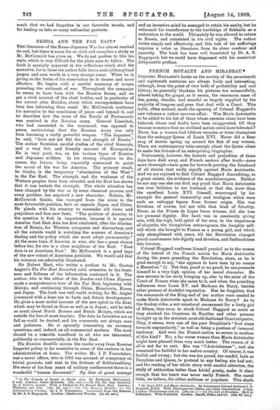• RUSSIA AND THE FAR EAST.*
THE literature of the Russo-Japanese War has almost reached its end, but there is room for so vivid and complete a study as Mr. McCormick has given us. We do not profess to like his style, which is very difficult for the plain man to follow. The fault is specially apparent in the reflections which stud the narrative, for in these the author falls into a semi-philosophical jargon and uses words in a very strange sense. When be is giving us the fruits of his observation he is clearer and more effective. He begins with a careful summary of events preceding the outbreak of war. Throughout the campaign he seems to have been with the Russian forces, and we get a vivid account of the chief battles, and in particular of the retreat after Mukden, about which correspondents have been less informing than usual. Mr. McCormick continues his narrative to the conclusion of peace and beyond it, and he describes how the news of the Treaty of Portsmouth was received in the Russian camp. General Linevitcb,
who had succeeded to the comman.d, was opposed to peace, maintaining that the Russian Army was only then becoming a really powerful weapon. "The Japanese," he said, "have not yet felt the real strength of Russia." The author furnishes careful studies of the chief Generals, and a very fair and friendly account of Kuropatkin. He is very good, too, on the various types of Russian
and Japanese soldiers. In his closing chapters he dis-
cusses the future, being especially concerned to point the moral of the war for America. The primary result, he thinks, is the temporary "elimination of the West" in the Far East. The strength and the weakness of the Western peoples have been revealed, and the East has shown that it can imitate the strength. The whole situation has been changed by the war as by some chemical process, and every problem has acquired a new character. Britain, Mr. McCormick thinks, has emerged from the crisis in the most favourable position, both as regards Japan and China. He pleads with his country to surrender old views and prejudices and face new facts. "The position of America in the question is first in importance, because it is against America that East Asia has first retaliated, after the elimina- tion of Russia, for Western arrogance and discourtesy, and all the outside world is watching the manner of America's dealing and the policy which she must adopt permanently." At the same time, if America is wise, she has a great chance before her, for she is a close neighbour of the East. "East Asia is an American East." Mr. McCormick is a good type of the new school of American publicist. We would add that his volumes are admirably illustrated.
Sir Robert Hart, who writes a preface to Mr. Gorton Angier's The Far East Revisited, calls attention to the fresh- ness and fullness of the information contained in it. The author, who is the editor of the London and China Express made a comprehensive tour of the Far East, beginning with Malaya, and continuing through China, Manchuria, Korea, and Japan. The book was well worth writing, for Mr. Angier journeyed with a keen eye to facts and future developments. He gives a most useful account of the new spirit in the East, which may be found in Siam as well as in Japan ; and he tells us much about North Borneo and Dutch Malaya, which are outside the ken of most tourists. The data he furnishes are as full as could be desired, and his comments are always sane and judicious. He is specially interesting on currency questions, and, indeed, on all commercial matters. The work should be a valuable handbook to all who are interested, politically or commercially, in the Far East.
The Russian Bastille carries the reader away from Russian
Imperial policy in far countries to some of the cankers in her administration at home. The writer, Mr. I. P. Youvatsher, was a naval officer, who in 1883 was accused of conspiracy on trivial grounds, and sent to the fortress of Schluesselburg. His story of his four years of solitary confinement there is a wonderful "human document." By dint of great courage • ;1) The Tragedy of Russia in Pacific Asia. By Frederick McCormick. 2 vols. London Grant Richards. 121s. net.]—(2) The Far East Revisited. By A. Gorton Angier. With a Preface by Sir Robert Hart, Bart. London Witberby and Sou. [10s. M. net.]—(3) The Russimi Bastille; or, The SchluesseLburg Fortress. By I. P. Youvatabev. Translated from the Russian
by Dr. A. S. Rappoport. London Chatto and Windua. 64. net.]
and an inventive mind he managed to retain his sanity, but he welcomed his transference to the hardships of Sakhalin as a restoration to the world. Ultimately he was allowed to return to Russia, and reinstated in his civil rights. The author writes simply and effectively, and this tale of his sufferings acquires a value as literature from its sheer candour and sincerity. The book has been well translated by Dr. A. S. Rappoport, but we could have dispensed with his somewhat dithyrambic preface.






































 Previous page
Previous page